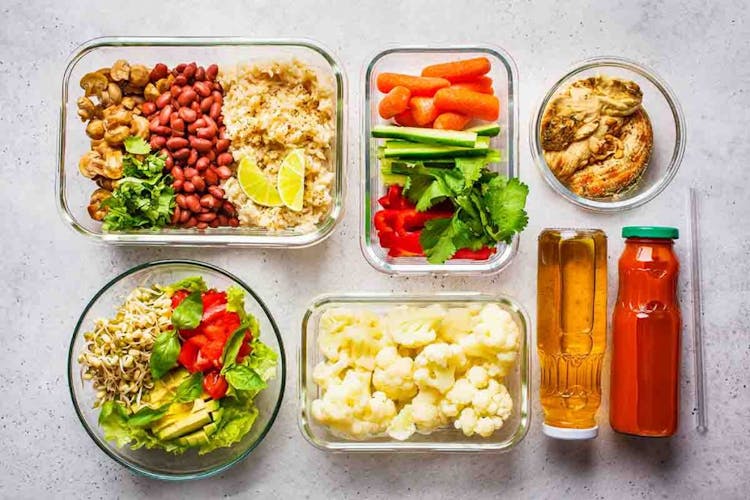A Guide to Mediterranean Diet Meal Planning for a Week
Published | 6 min read
Interested in trying the Mediterranean diet? Discover the benefits and find out the guidelines for creating a 7-day meal plan.

With a focus on flavourful produce, healthy fats, whole grains, and wholesome natural foods, the Mediterranean Diet can be a lifestyle change that is so enjoyable it won’t feel like a diet. The primary reason why people abide by the Mediterranean diet’s eating guidelines is to increase life expectancy. This diet can help lower the risk of chronic health problems.
According to Traditional Chinese Medicine (TCM) physician from Eu Yan Sang, Kong Teck Chuan, the elements of whole foods, plant-based diet – legumes, whole grains, fruits, vegetables and nuts, with a limited intake of refined foods and animal products can help to prevent, manage, and in some cases, reverse type 2 diabetes. This diet plan may also be prescribed simultaneously to people who have been diagnosed with cardiovascular disease or its risk factors, such as obesity, hypertension, hyperlipidaemia and inflammation.
Benefits of the Mediterranean Diet
Alternatively, consuming dietary fibres as part of a Mediterranean diet can help remove the hormones associated with breast and prostate cancer from the body. Similarly, these fibres can also help remove waste products from the digestive system. They can also help reduce a person’s risk of colorectal cancer.
However, people who are new to this diet may experience fatigue during the early stages. This is because the body is adjusting to a reduced calorie intake.
“They will start to feel more energised once their bodies acclimate to the consumption of plant-based foods. This makes up a Mediterranean diet. Growing children or girls who have started menstruating should consume fortified cereals or beverages. This is to ensure a sufficient intake of nutrients like vitamins B12 and D and calcium if they are on this diet.”
TCM Physician Kong Teck Chuan
People on a vegetarian diet can also consume eggs and dairy (albeit in lesser amounts), mushrooms, fortified foods or a health supplement to boost their intake of vitamin B12. Here are a few steps that you can take to create a 7-day Mediterranean diet plan.
Choose Your Recipes for the Week
This is the most crucial step as it sets the tone for the entire meal planning process. To do this effectively, it is advisable for you to look for recipes that you already know how to cook. You may also look for recipes that require the use of minimal ingredients. Some of the recommended ones are:
- Fresh fruits and vegetables, e.g., tomatoes, spinach, apples, pears
- Whole grains, e.g., quinoa, brown rice, barley, oats, whole-wheat bread
- Fish, i.e., salmon, tuna, sardines
- Legumes, e.g., chickpeas, lentils, beans
- Poultry, unsweetened yoghurt, and eggs
You can look for recipes meant for more than just one or two people, as they can give you leftovers. But most importantly, only cook what you enjoy eating. Ideally, you may also use honey with propolis to prepare your meals. Drizzle it over a fruit salad or make a parfait by mixing it with yoghurt and stewed fruits. This is to supplement your body with vitamins, amino acids, and enzymes.
Build Your Grocery List

This process involves two essential steps that will ensure you never run out of stock every week. Firstly, look through your recipes and start listing down all the ingredients that you will need. Next, go through your refrigerator, freezer, and kitchen, and cross off the ingredients you already have.
In addition, you can add Chinese medicinal ingredients like China root (土茯苓), fox nuts (also known as euryale seeds), lotus seeds and Japanese mountain yam to your grocery list. You can use these ingredients to prepare a herbal soup that strengthens your spleen and regulates digestive functions.
Grouping the ingredients you need according to their respective departments at the grocery store is also recommended. This will enable you to save time and prevent you from overlooking any of the listed ingredients when doing your weekly grocery shopping.
You can also supplement your health by consuming a Chlorella supplement. This is aligned with the guidelines of a Mediterranean diet. It is suitable for adults and children aged 6 years or older and is associated with numerous health benefits. These include the ability to rid your body of toxins, boost energy levels and enhance your immune system.
Block Your Calendar for Meal Preparation
The amount of time you set aside to prepare meals is highly dependent on whether you like cooking in the first place. If you like cooking, then you can block a specific day during the week to prepare all your meals at once.
You can also take advantage of small pockets of time to prepare different components of your meals throughout the weekend. For example, you may use a 20-minute window after doing the dishes to stir-fry vegetables or make overnight oats by stacking ingredients that are in line with Mediterranean diet guidelines in a jar.
Be sure to also take your health supplements on time whilst preparing your meals. For example, you can consume an omega-3 fish oil supplement once daily to reduce your risk of coronary heart disease.
Invest in Affordable, High-Quality Glass Containers

Using the right storage equipment is important for ensuring food freshness. Though heavier, glass containers have the advantage of being the recyclable, healthier alternative than plastic containers. They are also able to maintain food freshness for longer.
You can store prepared meals in stainless steel containers as these are ideal for keeping food warm or chilled. To make chilled food last longer, you can refrigerate stainless steel containers before storing them. In the same way, you can also warm these containers with boiling water.
Preparing a weekly meal plan that is in accordance with the guidelines of a Mediterranean diet may seem difficult at first but will get easier with experience. Thankfully, practising these guidelines will help to lower your risk of disease and enable you to enjoy the things you love for longer.
References
- Harvard T.H. Chan. Diet Review: Mediterranean Diet. [online] Available at [Accessed 13 August 2021]
- Kitchn. 2017. The Beginner’s Guide to Meal Planning: What to Know, How to Succeed, and What to Skip. [Accessed 13 August 2021]
- SCL Health. Meal Planning in 4 Easy Steps. [Accessed 13 August 2021]
- Nutrition Reviews, PubMed. 2013. How prevalent is vitamin B(12) deficiency among vegetarians? [Accessed 13 August 2021]
- Journal of Geriatric Cardiology, PMC. 2017. A plant-based diet for the prevention and treatment of type 2 diabetes. [Accessed 13 August 2021]
Share this article on






